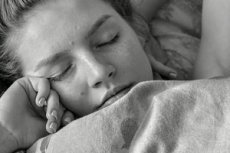Medical expert of the article
New publications
Back pain in the morning after sleeping and after eating
Last reviewed: 06.07.2025

All iLive content is medically reviewed or fact checked to ensure as much factual accuracy as possible.
We have strict sourcing guidelines and only link to reputable media sites, academic research institutions and, whenever possible, medically peer reviewed studies. Note that the numbers in parentheses ([1], [2], etc.) are clickable links to these studies.
If you feel that any of our content is inaccurate, out-of-date, or otherwise questionable, please select it and press Ctrl + Enter.

The causes of morning pain in the spine and/or soft tissues of the back after a night's rest can be different - from banal inconveniences of the sleeping place to serious diseases. If a person with a spinal injury also sleeps on an uncomfortable bed, then the pain can be quite strong and long-lasting.
An incorrectly arranged sleeping place does not allow the spine to fully relax, tense muscles spasm, and in the morning we feel pain in the cervical, thoracic or lumbar region, and sometimes in several. The cause of this condition may be too soft a fluffy feather bed, a high or low pillow. Ideally, bedding (mattress and pillows) should be orthopedic.
Muscle spasms in the morning can be caused by simply an uncomfortable sleeping position (this is a one-time situation), physical overexertion, an injury received the day before (stretching, displacement), prolonged sitting before bed, for example, while playing a computer game. In the case of gaming addiction, a stress factor is added to a long-term sitting position and visual strain, which also contributes to the occurrence of muscle spasms.
The presence of scoliosis, kyphosis causes prolonged pain in the morning after waking up, but the most common factor in the modern world is osteochondrosis. Depending on the localization of the pathology, pain after sleep occurs in the cervical, thoracic or lumbar region. If, despite the presence of a comfortable orthopedic mattress and pillow, you suffer from back pain in the morning, you need to be examined for osteochondrosis.
In addition, back pain in the morning after sleep is a characteristic sign of collagenoses - diseases of connective tissue affecting both cartilage and internal organs (ankylosing spondylitis, rheumatoid arthritis, arthrosis, etc.). Morning pain may be accompanied by tuberculosis, diseases of the digestive and genital organs (mainly felt in the lower back and coccyx), kidney disease (pain is localized on the side and radiates to the lower back). Back pain in the morning may be psychogenic in nature and be a reaction to a stressful situation (acute or chronic).
Only a qualified doctor can make a correct diagnosis after a thorough examination.
Back pain after eating
The connection between back pain and food intake is typical for many diseases of the organs involved in the digestive process.
The recognized leader in this regard by gastroenterologists is the pancreas. The acute period of its inflammation is characterized by pain that squeezes the patient like a hoop ( girdling ). But this is not always the case, in some cases it is simply felt in the back (radiates to the back). Usually under the left shoulder blade or between the shoulder blades. The pain is often aching, appearing after eating, and its intensification is associated with eating.
The second most common symptom is the gallbladder, or more precisely, cholelithiasis ( gallstone disease ). In this case, after eating, the pain radiates to the back under the right shoulder blade or between the shoulder blades and the lower back. Such pain may be the only symptom of the presence of stones in the gallbladder or its ducts. And there may be other signs of dyspepsia - bitterness in the mouth, flatulence, metallic taste on the tongue. Very rarely, but with cholecystitis, pain can be felt in the neck, more precisely - the right supraclavicular fossa. Especially if these pains are combined with an elevated body temperature, you must urgently seek help.
"Hunger" pains in the back can be observed with a stomach ulcer (duodenal ulcer). Sometimes they are felt at night or in the morning on an empty stomach, there is a sharp, to the point of fainting, feeling of hunger, nausea rises in the throat.
Intestinal diseases can also cause lumbar pain, however, in this case, it is not associated with food intake.
In addition to pain felt in the back and associated with food intake, diseases of the digestive organs are manifested by the presence of symptoms of digestive disorders - heartburn, nausea, constipation, belching, and others.
Back pain after eating can also occur with osteochondrosis, since the internal organs are attached to the spine and the process of food passing through the digestive tract is reflected by pain in the spine, often in the lumbar region. Additional symptoms indicating the presence of osteochondrosis may be increased pain during movement, dizziness, paresis of the limbs, muscle weakness.
Such pains occur with kidney and heart diseases, in particular, with myocardial infarction. They radiate to the back, which makes it very difficult to establish a diagnosis without laboratory and instrumental studies. With kidney diseases, an additional symptom may be a violation of emptying the bladder. With a heart attack, the pain radiates to the left arm, neck, jaw and is accompanied by weakness, nausea and drowsiness.


 [
[